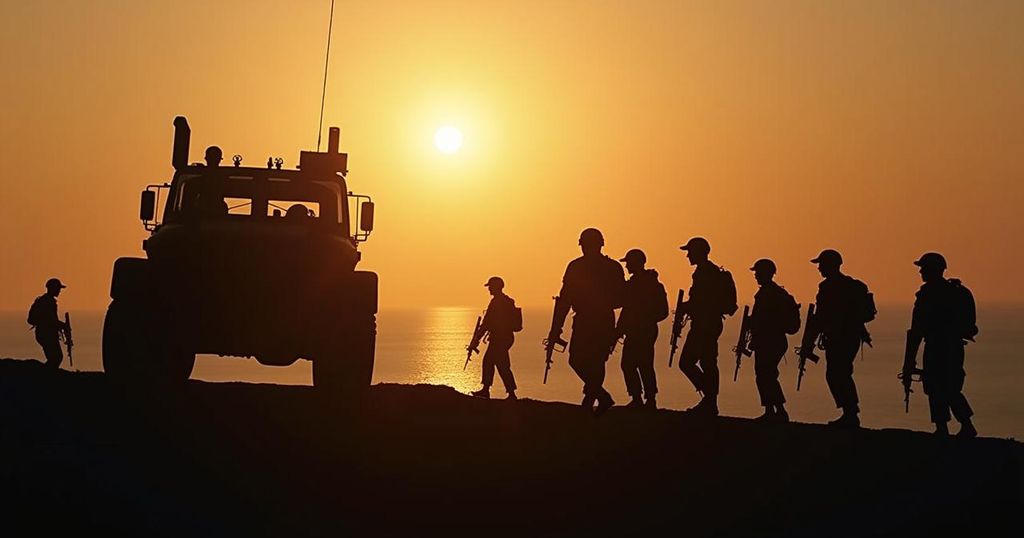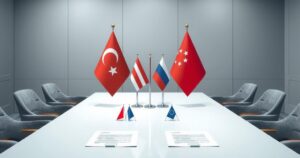Egypt’s Military Engagement with Somalia: Implications for Regional Security

Egypt delivered its second weapons shipment to Somalia on September 23, 2024, including anti-aircraft guns and artillery, amid rising tensions in the Horn of Africa primarily due to disagreements over the Grand Ethiopian Renaissance Dam (GERD) and internal strife involving Somaliland. Experts warn of the potential danger of these arms falling into the hands of al-Shabaab, while also indicating that Egypt’s military positioning signals readiness to engage Ethiopia directly. The situation complicates regional security, especially given increased interest from Ethiopia in Somaliland’s strategic coastal access.
On September 23, 2024, Egypt conducted its second weapons delivery to Somalia within a month, raising concerns of escalating tensions in the Horn of Africa. This latest shipment, made via an Egyptian warship, included anti-aircraft guns and artillery, potentially setting the stage for conflict involving Egypt, Ethiopia, Somalia, and the autonomous region of Somaliland. The relationship between Egypt and Somalia has strengthened this year, particularly as both nations have distanced themselves from Ethiopia due to rising tensions over the Grand Ethiopian Renaissance Dam (GERD). Since its construction commenced in 2011, Egypt has regarded the dam as a significant threat to its vital water supply. Despite numerous negotiation attempts, including a U.S.-facilitated engagement in 2019, no sustainable agreement has been established between the parties involved. Somalia’s discontent towards Ethiopia further escalated when Ethiopia signed a preliminary deal with Somaliland in January, allowing it to lease land for a port in exchange for potential recognition of Somaliland’s independence. Somalia challenges this, asserting that Somaliland remains an integral part of its territory. Reacting to Egypt’s recent arms shipment, Somaliland expressed apprehension regarding the possibility of these weapons being appropriated by Islamist factions, particularly al-Shabaab. Expert assessments suggest that the flow of arms into Somalia poses a grave risk. Bill Roggio noted, “Egypt’s shipment of weapons to Somalia runs the risk of dangerous weapons systems, such as anti-aircraft guns and artillery, falling into the hands of al-Shabaab — al-Qaeda’s branch in East Africa.” He further elaborated on the vulnerabilities of the Somali government, emphasizing the potential for al-Shabaab to overwhelm military installations. Additionally, Mariam Wahba indicated that Egypt’s military support to Somalia illustrates Cairo’s displeasure towards Ethiopia and its intent to confront them militarily, thereby exacerbating regional security threats. The significance of Somaliland’s access to the Red Sea is increasing, particularly against a backdrop of Houthi attacks disrupting global shipping and severely affecting Egypt’s Suez Canal revenues in the past year. Ethiopia’s interest in leasing Somaliland’s coastal areas, potentially establishing a naval base, raises questions about maritime security amid ongoing threats from Houthi insurgents in Yemen. Overall, the situation remains intricate and precarious, with potential ramifications for regional stability and security in the Horn of Africa.
The Horn of Africa has historically been a region of geopolitical tension, particularly between Egypt, Ethiopia, and Somalia. The construction of the GERD has escalated disputes over water rights, with Cairo perceiving it as a threat to its water security. The dynamics are further complicated by Somalia’s internal divisions, especially concerning Somaliland, and the rising influence of Islamist groups like al-Shabaab, which continue to challenge the Somali government’s authority. Egypt’s military support to Somalia is seen as a strategic maneuver to counter Ethiopian influence in the region, particularly in light of ongoing tensions surrounding the Nile River and the GERD.
In summary, Egypt’s recent arms shipment to Somalia highlights significant geopolitical tensions in the Horn of Africa, primarily driven by longstanding disputes over the GERD and rising threats from al-Shabaab. The potential for escalating conflicts involving multiple actors, coupled with the looming risk of destabilization, underscores the urgent need for diplomatic engagement and conflict resolution mechanisms in the region.
Original Source: www.fdd.org






